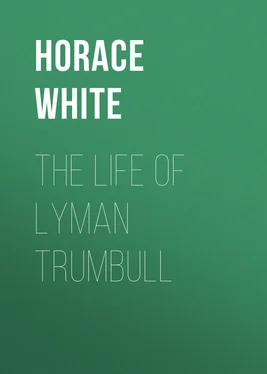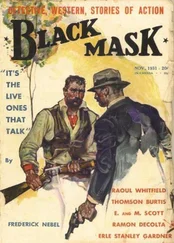Horace White - The Life of Lyman Trumbull
Здесь есть возможность читать онлайн «Horace White - The Life of Lyman Trumbull» — ознакомительный отрывок электронной книги совершенно бесплатно, а после прочтения отрывка купить полную версию. В некоторых случаях можно слушать аудио, скачать через торрент в формате fb2 и присутствует краткое содержание. Жанр: foreign_prose, История, foreign_edu, foreign_antique, на английском языке. Описание произведения, (предисловие) а так же отзывы посетителей доступны на портале библиотеки ЛибКат.
- Название:The Life of Lyman Trumbull
- Автор:
- Жанр:
- Год:неизвестен
- ISBN:нет данных
- Рейтинг книги:5 / 5. Голосов: 1
-
Избранное:Добавить в избранное
- Отзывы:
-
Ваша оценка:
- 100
- 1
- 2
- 3
- 4
- 5
The Life of Lyman Trumbull: краткое содержание, описание и аннотация
Предлагаем к чтению аннотацию, описание, краткое содержание или предисловие (зависит от того, что написал сам автор книги «The Life of Lyman Trumbull»). Если вы не нашли необходимую информацию о книге — напишите в комментариях, мы постараемся отыскать её.
The Life of Lyman Trumbull — читать онлайн ознакомительный отрывок
Ниже представлен текст книги, разбитый по страницам. Система сохранения места последней прочитанной страницы, позволяет с удобством читать онлайн бесплатно книгу «The Life of Lyman Trumbull», без необходимости каждый раз заново искать на чём Вы остановились. Поставьте закладку, и сможете в любой момент перейти на страницу, на которой закончили чтение.
Интервал:
Закладка:
If so [he continued], what is meant by all the leaders of that great party, of which he (Trumbull) has become so prominent a member, when they charge me with violating a solemn compact—a compact which they say consecrated that territory to freedom forever? They say it was a compact binding forever. He says that it was an unfounded assumption, for it was only a law which would become void without even being repealed; it was a mere legislative enactment like any other territorial law, and the word "forever" meant no more than the word "hereafter"—that it would expire by its own limitation. If this assumption be true, it necessarily follows that what he calls the Missouri Compromise was no compact—was not a contract—not even a compromise, the repeal of which would involve a breach of faith. 25
And he continued, ringing the changes on this alleged inconsistency through two entire columns of the Globe , as though a compact could not be made respecting a territory as well as for a state, and ignoring the fact that if slaves were prevented from coming into the territory, the material for forming a slave state would not exist when the people should apply for admission to the Union. If the word "forever" had, as Trumbull believed, applied only to the territory, it nevertheless answered all practical purposes forever, by moulding the future state, as the potter moulds the clay. 26
The remainder of Douglas's speech was founded upon the doings of Governor Reeder, whom he first used to buttress and sustain the bogus legislature in its acts, and then turned upon and rent in pitiable fragments, calling him "your Governor," as though the Republicans and not their opponents had appointed him.
June 9, 1856, the two Senators drifted into debate on the Kansas question again, and Trumbull put to Douglas the question which Lincoln put to him with such momentous consequences in the Freeport debate two years later: whether the people of a territory could lawfully exclude slavery prior to the formation of a state constitution. Trumbull said that the Democratic party was not harmonious on this point. He had heard Brown, of Mississippi, argue on the floor of the Senate that slavery could not be excluded from the territories, while in the formative condition, by the territorial legislature, and he had heard Cass, of Michigan, maintain exactly the opposite doctrine. He would like to know what his colleague's views were upon that point:
My colleague [he said] has no sort of difficulty in deciding the constitutional question as to the right of the people of a territory, when they form their constitution, to establish or prohibit slavery. Now will he tell me whether they have the right before they form a state constitution? 27
Douglas did not answer this interrogatory. He insisted that it was purely a judicial question, and that he and all good Democrats were in harmony and would sustain the decision of the highest tribunal when it should be rendered. The Dred Scott case was pending in the Supreme Court, but that fact was not mentioned in the debate. The right of the people of a territory to exclude slavery before arriving at statehood was already the crux of the political situation, but its significance was not generally perceived at that time. That Trumbull had grasped the fact was shown by his concluding remarks in this debate, to wit:
My colleague says that the persons with whom he is acting are perfectly agreed on the questions at issue. Why, sir, all of them in the South say that they have a right to take their slaves into a territory and to hold them there as such, while all in the North deny it. If that is an agreement, then I do not know what Bedlam would be.
Bedlam came at Charleston four years later. It is worthy of remark that in this debate Douglas held that a negro could bring an action for personal freedom in a territory and have it presented to the Supreme Court of the United States for decision. In the Dred Scott case, subsequently decided, the court held that a negro could not bring an action in a court of the United States.
The Senate debate on Kansas affairs in the first session of the Thirty-fourth Congress was participated in by nearly all the members of the body. The best speech on the Republican side was made by Seward. This was a carefully prepared, farseeing philosophical oration, in which the South was warned that the stars in their courses were fighting against slavery and that the institution took a step toward perdition when it appealed to lawless violence. Sumner's speech, which in its consequences became more celebrated, was sophomorical and vituperative and was not calculated to help the cause that its author espoused; but the assault made upon him by Preston S. Brooks maddened the North and drew attention away from its defects of taste and judgment. Collamer, of Vermont, made a notable speech in addition to his notable minority report from the Committee on Territories. Wilson, of Massachusetts, and Hale, of New Hampshire, received well-earned plaudits for the thoroughness with which they exposed the frauds and violence of the Border Ruffians, and commented on the vacillation and stammering of President Pierce. That Trumbull had the advantage of his wily antagonist must be the conclusion of impartial readers at the present day.
If a newcomer in the Senate to-day should plunge in medias res and deliver a three-hours' speech as soon as he could get the floor, he would probably be made aware of the opinion of his elders that he had been over-hasty. It was not so in the exciting times of the decade before the Civil War. All help was eagerly welcomed. Moreover, Trumbull's constituents would not have tolerated any delay on his part in getting into the thickest of the fight. Any signs of hanging back would have been construed as timidity. The anti-Nebraska Democrats of Illinois required early proof that their Senator was not afraid of the Little Giant, but was his match at cut-and-thrust debate as well as his superior in dignity and moral power. The North rang with the praises of Trumbull, and some persons, whose admiration of Lincoln was unbounded and unchangeable, were heard to say that perhaps Providence had selected the right man for Senator from Illinois. Although Lincoln's personality was more magnetic, Trumbull's intellect was more alert, his diction the more incisive, and his temper was the more combative of the two.
From a mass of letters and newspapers commending Mr. Trumbull on his first appearance on the floor of the Senate, a few are selected for notice.
The New York Tribune , March 15, 1856, Washington letter signed "H. G.," p. 4, col. 5:
Mr. Trumbull's review of Senator Douglas's pro-slavery Kansas report is hailed with enthusiasm, as calculated to do honor to the palmiest days of the Senate. Though three hours long, it commanded full galleries, and the most fixed attention to the close. It was searching as well as able, and was at once dignified and convincing.
When Mr. Trumbull closed, Mr. Douglas rose, in bad temper, to complain that the attack had been commenced in his absence, and to ask the Senate to fix a day for his reply. He said Mr. Trumbull had claimed to be a Democrat; but that claim would be considered a libel by the Democracy of Illinois. Here Mr. Crittenden rose to a question of order, and a most exciting passage ensued; the flash of the Kentuckian's eye and the sternness of his bearing were such as are rarely seen in the Senate.
The New York Daily Times , Washington letter, dated June 9:
Douglas was much disconcerted to-day by Senator Trumbull's keen exposure of his Nebraska sophism. He was directly asked if he believed that the people of the territories have the right to exclude slavery before forming a state government, but he refused to give his opinion, saying that it was a question to be determined by the Supreme Court. Trumbull then exposed with great force Douglas's equivocal platform of popular sovereignty, which means one thing at the South and another at the North. The "Little Giant" was fairly smoked out.
Читать дальшеИнтервал:
Закладка:
Похожие книги на «The Life of Lyman Trumbull»
Представляем Вашему вниманию похожие книги на «The Life of Lyman Trumbull» списком для выбора. Мы отобрали схожую по названию и смыслу литературу в надежде предоставить читателям больше вариантов отыскать новые, интересные, ещё непрочитанные произведения.
Обсуждение, отзывы о книге «The Life of Lyman Trumbull» и просто собственные мнения читателей. Оставьте ваши комментарии, напишите, что Вы думаете о произведении, его смысле или главных героях. Укажите что конкретно понравилось, а что нет, и почему Вы так считаете.












